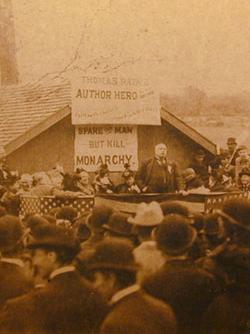Questions and Answers
What did Jesus Christ say about His crucifixion and resurrection?
Question: My church has some special observances for "Good Friday"—the Friday before Easter Sunday. I have looked in my Bible for evidence of Good Friday, but cannot find it there. What am I overlooking?
Answer: You should be commended for your careful reading of Scripture! The Bible does reveal what happened on the Friday before Jesus Christ's resurrection—but the truth is not what most professing Christians today believe!
We know from Scripture that Christ spent three full days and nights—72 hours—in the grave. He had to do this in order to fulfill the biblical "sign of Jonah" as He proclaimed. "But He answered and said to them, 'An evil and adulterous generation seeks after a sign, and no sign will be given to it except the sign of the prophet Jonah. For as Jonah was three days and three nights in the belly of the great fish, so will the Son of Man be three days and three nights in the heart of the earth'" (Matthew 12:39-40).
This fact by itself debunks the common chronology leading from Good Friday through Easter Sunday. If Christ had been resurrected on Easter Sunday, He would have had to be in the grave by no later than the end of the day on Thursday—not Friday.
What do we know about the timing of Christ's resurrection? Notice this account: "Now on the first day of the week Mary Magdalene went to the tomb early, while it was still dark, and saw that the stone had been taken away from the tomb. Then she ran and came to Simon Peter, and to the other disciple, whom Jesus loved, and said to them, 'They have taken away the Lord out of the tomb, and we do not know where they have laid Him'" (John 20:1-2).
This means that Mary went to Christ's tomb in the night hours after the Sabbath (after sunset on Saturday, before sunrise on Sunday), and found that Jesus was not in the tomb. This lets us push back still further the time of Christ's death, to no later than the pre-sunrise hours of Thursday.
Scripture, however, makes it clear that Jesus was buried late in the day, shortly before the start of an annual Sabbath day. We read: "So when Jesus had received the sour wine, He said, 'It is finished!' And bowing His head, He gave up His spirit. Therefore, because it was the Preparation Day, that the bodies should not remain on the cross on the Sabbath (for that Sabbath was a high day), the Jews asked Pilate that their legs might be broken, and that they might be taken away" (John 19:30-31).
The "Preparation Day" is the day before the Sabbath, when tasks are performed in anticipation of the coming Sabbath rest from workaday activities. But we have already seen that Friday cannot be the day of Christ's death, since He had to have been dead for 72 hours before the end of the last day of the week! Is this an apparent contradiction in Scripture? No! What many readers forget is that a Preparation Day may also precede an annual Sabbath—one of the Holy Days, listed in Leviticus 23, which God set aside for yearly observance.
If Christ was put in the grave on Wednesday before sunset, He would have been in the grave for 72 hours by late Saturday afternoon, rising just before the first day of the week began.
So, in summary, we know from Scripture that on the Friday before His resurrection, Jesus Christ was already dead in the grave, fulfilling prophecy. Traditions that insist He was alive and preparing for a Sunday resurrection are denying not only the plain words of Scripture, but also the very sign Jesus gave of His Messiahship. If you worship a Messiah who rose on Sunday after 36 hours in the grave, you are not worshiping the true Jesus Christ, but rather a counterfeit Jesus invented by men who want to draw attention away from God and His Truth. To learn more about many false teachings that have been promoted in the name of "Christianity," please request your free copy of our booklet, Satan's Counterfeit Christianity.






